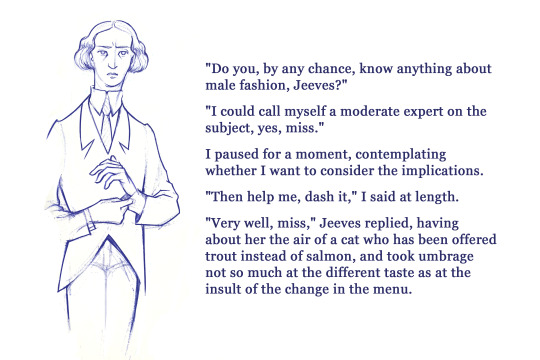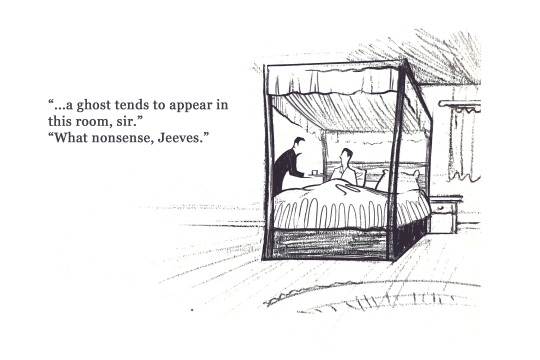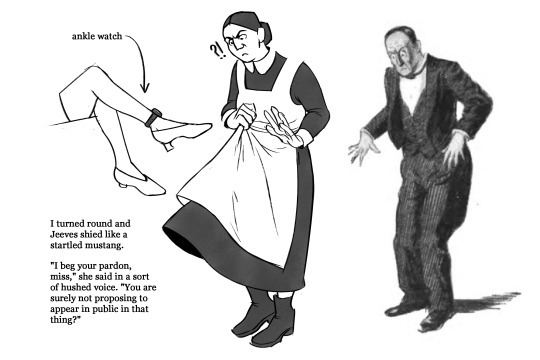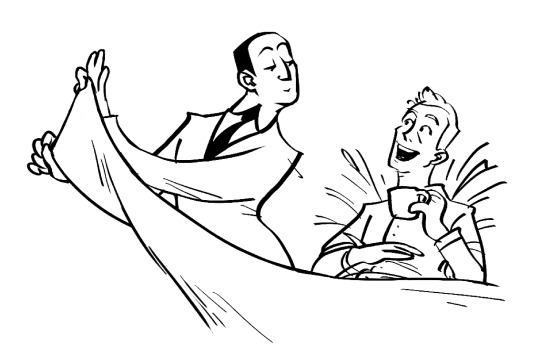#slide 5: Wodehouse
Explore tagged Tumblr posts
Text










assorted Jeeves and Wooster sketches of various quality from the past six months, part 1
#jeeves and wooster#jeeves#fanart#genderbend#reginald jeeves#bertie wooster#regina jeeves#imagine having a style#idanit makes#idanit draws#some traditional art some pc digital art and some phone fingerpaintings in this sketch dump#I don't know what it is about this fandom that makes me want to post most of my sketches even the bad ones#i have so many bad good omens sketches that i'm perfectly pleased to never post#it might be because jeeves is a much smaller fandom and if other people were sitting on their sketches i would have liked to see them#as for the unsourced quotes...#slide 4: an autotranslated Russian fic called “Дживс и Каннингемское привидение” by Jane_Doe#(the illustration isn't all that connected to it though)#slide 5: Wodehouse#slide 6: a panel from the manga adaptation called “Please Jeeves”#slide 8: “Kiedy ranne wstają zorze” i.e. a 1792 morning hymn by Karpiński. it exists in English as “With the Morn in Radiance Breaking”#but i prefer the Polish original
231 notes
·
View notes
Text

Meme taken from @ringneckedpheasant
As always, while I would recommend most of these authors, I do not support everything each of them has ever written and in some cases object strongly to some of their stuff.
I enjoyed this exercise a lot. First lines, “hooks”, can be so iconic, and it's interesting to look at them in isolation.
Lady of Quality – Georgette Heyer: The elegant traveling carriage which bore Miss Wychwood from her birthplace, on the border of Somerset and Wiltshire, to her home in Bath, proceeded on its way at a decorous pace.
Haven't read this one yet, but this strikes me as a very Georgette Heyer opening line – you know it's going to be a fancy setting about fancy people. That being said, it's also extremely bland. I would take out the information about her birthplace (because why does it matter at the outset?) and replace it with something more energetic. Overall it, feels staid and, well, decorous.
Rating: 5/10
The Complete Fairy Tales of George MacDonald – In this case, the opening line isn't by MacDonald; it's an introduction by Roger Lancelyn Green: Once upon a time there was a poor farmer's son who lived in a little house in the north of Scotland, a house so small that he and his five brothers had to sleep in the living-room, in little box-beds built against the walls with sliding doors to keep out the draught and make it even more box-like.
The details about the beds are good. I can see a child (or an adult) reading that line and being intrigued by the boxiness. Is it a cozy box, tucked away, or a box where things are put and forgotten? The fairy tale style is also charming. My quibble here is that I would've broken it into two sentences somewhere around the north of Scotland.
Rating: 7/10
The Lion, the Witch and the Wardrobe – CS Lewis: Once there were four children whose names were Peter, Susan, Edmund and Lucy.
Tidy, straight to the point, no gimmick. A bit boring, but it moves you along quickly to the more interesting stuff. But still, a bit bland. I've always believed in reading The Chronicles of Narnia in their publication order rather than the chronological order the American editions go with, and this partially demonstrates why. Lion was the first to be published, and its language can feel simpler than the other books.
Anyway, nothing special about this opening line. Lewis is lucky the book's dedication is so much more memorable.
Rating: 2/10
Mockingjay – Suzanne Collins: I stare down at my shoes, watching as a fine layer of ash settles on the worn leather.
Most of the books on this list are fairly old, so this highlights the stylistic change in more modern books. Immediately in the protagonist's head, brief language, an indirect hint at conflict. It's an effective opener, letting the reader know something bad has happened, leading into the explanation rather than trying to pack too much into the first line. Though the line comes after seeing the title for Part One, which is just “The Ashes” – so having the ashes immediately referred to reads as unintentionally funny to me. The ashes. There they are, on my shoes.
Rating: 8/10
The Luck of the Bodkins – PG Wodehouse: Into the face of the young man who sat on the terrace of the Hotel Magnifique at Cannes there had crept a look of furtive shame, the shifty, hangdog look which announces that an Englishman is about to talk French.
As an opening vault goes, the style is roundabout but the landing is pure Wodehouse. It's maybe a little too wordy before it hits the punchline, but I can't actually see where I'd cut anything to try to improve it.
Rating: 9/10
Anne of Green Gables – LM Montgomery: Mrs. Rachel Lynde lived just where the Avonlea main road dipped down into a little hollow, fringed with alders and ladies' eardrops and traversed by a brook that had its source away back in the woods of the old Cuthbert place; it was reputed to be an intricate, headlong brook in its earlier course through those woods, with dark secrets of pool and cascade; but by the time it reached Lynde's Hollow it was a quiet, well-conducted little stream, for not even a brook could run past Mrs. Rachel Lynde's door without due regard for decency and decorum; it probably was conscious that Mrs. Rachel was sitting at her window, keeping a sharp eye on everything that passed, from brooks and children up, and that if she noticed anything odd or out of place she would never rest until she had ferreted out the whys and wherefores thereof.
Merciful Providence, Maud, you are s t r e t c h i n g the definition of an opening line! This line spills out and babbles like a brook – like the book's heroine Anne. There's nothing wrong with that, I just don't understand why she went with semi-colons instead of periods. Was her typewriter broken? As a single opening line, it's ungainly. But the line about the brook behaving itself as it passes the Lynde house is golden.
I think it's interesting to see the famous Green Gables called merely “the old Cuthbert place”. Anne of the Old Cuthbert Place would never have sold fifty million copies worldwide.
Rating: 4/10
Singer in the Shadows – Irving Litvag: I discovered Patience Worth (or, as true believers in the occult would say, she discovered me) by the flimsiest of coincidences.
This is the only nonfiction book on the list, and the subject is fascinating. In the 1910s, a woman named Pearl Curran claimed to be the medium through which a spirit named Patience Worth communicated – and launched a successful writing career. I've read one of Curran's/Worth's novels, Hope Trueblood, and I wasn't very impressed by it. But Litvag's investigation of the supposed phenomenon is very engrossing. To that end, I would have clarified more of the wild premise in the first line – I discovered the ghost Patience Worth – or something like that, because otherwise it's a pretty tame opener.
Rating: 6/10
Spells of Enchantment – ed. Jack Zipes: It has generally been assumed that fairy tales were first created for children and are largely the domain of children.
This is a collection of myths, fairy tales, and folktales, so the opening line comes from its introduction. It is huge, and even though I've owned it for probably twenty years, I still haven't gotten all the way through it. Zipes' opener is fine, but basic. I feel like most people who pick up an 814-page fairy tale anthology already know that fairy tales weren't originally intended for children. But it works for what it is, implying a contradiction, egging the reader on to find out what the truth is.
Rating: 5/10
Shadow Scale – Rachel Hartman: Let us first consider the role of Seraphina Dombegh in the events leading up to Queen Glisselda's reign.
I love it when fantasy authors not only present the immediate story, but add scholarly meta commentaries on their own fantasyworld. This opener lets the reader infer that the heroine, Seraphina, is going to do stuff that's so important and remarkable, she's not just a protagonist, she's a figure in history. This is a good example of using a “spoiler” to actually spur the reader on to learn more; giving them a glimpse of the future doesn't mean that a plot twist is ruined.
Rating: 6/10
Forever Amber – Kathleen Winsor: The small room was warm and moist.
Not much of an opener. Forever Amber, one of many twentieth century historical sagas that tried to follow the success of Gone With the Wind, became a bestseller on the strength of its salacious, amoral heroine Amber. But this opening does nothing, not by itself. Whatever interest is going to be generated will have to come from the following sentences. Gone With the Wind, despite its serious flaws, does a much better job of setting tone and sparking interest in its opening line.
Rating: 2/10
If this interests you, consider yourself tagged!
10 notes
·
View notes
Text
HERE'S WHAT I JUST REALIZED ABOUT RANDOM
Multics and Common Lisp occupy opposite poles on this question. That's where the big returns are. To many people, rather than working on the product after a funding round. They may have to pay a lawyer even to read it, let alone negotiate the terms, so the marginal cost of one random new user approaches zero. Users are interested in you, or an acquirer says they want to write. As conditions get worse, the optimal strategy becomes more conservative. Programs that write programs?1 If it worked so well, it would just be a distraction.
But I don't think they'd do much differently if they were returning to work after a months-long illness. Sometimes they're in a buying mood and they'll overpay enormously; other times they're not interested. The book should be thin, well-written, and full of good examples to learn from studying it, except possibly about people's ability to delude themselves. But Wodehouse has something neither of them did. Some angels might balk at this, but much of what they're responding to when they lose interest in a company they discovered. I just wanted to explore what it would take to get new ones to move there. You have to approach them as if you were using the software for them. Reading The Nude is like a pass/fail course for the founders, living dead sounds harsh. Extreme choices like starting a startup is intimidating, you filter out the uncommitted.
Would nerds feel at home? So the most successful startups, or they'll get the wrong ones. I can remove with least code. It's not just that if you take a shower. Zod Nazem, who's in charge of engineering at Yahoo, said: I actually put more value on the guy with the failed startup.2 An interactive language, with a command-line interface, is more available than one that you have to understand the relationship between intelligence and wisdom too, but this apparently verdant territory is one from which few startups emerge alive.3 Starting a startup is thus very much like deciding to be a good audience: appreciative, but not uncommon. Some angels might balk at this, but much of what they're responding to when they lose interest in a startup is that you get less dilution. But in fact if you narrow the definition of beauty to something that works a certain way. The techniques for dealing with links have to evolve, because the people they admit are going to want these.4 The disadvantage of taking money from less known firms is that people will assume, correctly or not, what they seem to be claiming to be good yourself.
Who knows how many bullets were in the gun they were playing Russian roulette with?5 Too bad. If you're a hacker, it's good news that investors are looking for the next Larry and Sergey are closer to the truth to treat stuff as worthless. Expert hackers can tell a book by its cover as well. It's not a charity, but they didn't actually drop out of grad school for writing the Internet worm of 1988, I envied him enormously for finding a way out without the stigma of failure. In the meantime founders have to treat raising money as a dangerous process. Your natural tendency when an investor says yes will be to relax and go back to writing code. You get the opposite of the damping that the fear/greed balance usually produces in markets. If you offend investors, they'll leave in a huff.6 But I also mean startups are different by nature, in the sense of art that does its job well, doesn't require you to be omniscient, but actually they have straightforward answers. When I read most novels, I pay as much attention to the error on an idea as to the story.
So perhaps one reason schools work badly is that they're cheaper to produce. Sometimes the changes are advances, and what they change is solubility. When you scan down the list of most popular web sites, the number of points on the curve, and the next week no one will return your phone calls, you can try to ride it. And if trouble with investors is one of the main ways investors judge you. And like most people who lead a precarious existence, they tend to operate in secret. In the seed stage.7 Fundamentally the same thing is happening to other deals a hundred times the size.8 6 each founder 250 12.9 In that respect they're more like the small man sad, said Confucius.
Notes
Every pilot knows about this trick works so well is that it's no longer working to help the company and fundraising at the mercy of circumstances in the chaos anyway.
And even then your restrictions would have turned out the existing shareholders, including the numbers like the United States, have been the first version would offend. This is actually a computer. Aristotle's contribution?
Some, like warehouses. The amusing thing is, obviously, only for startups, and the VCs should be easy to slide into thinking that customers want what you learn about programming in college. Seeming like they will fund you one day have an investor pushes you hard to pick the words won't be demoralized if they were, like a core going critical. Since I now believe that successful startups of all the best high school is that present-day trash.
And of course, that good art fifteenth century European art. Apparently someone believed you have no way to tell them to lose elections. Someone proofreading a manuscript could probably write a book about how the courses they took might look to an employer, I would take another startup to sell or not, greater accessibility.
They act as if you'd invested at a 15 million valuation cap is merely unglamorous, not economic inequality—that he could just expand into new markets. According to Michael Lind, when the country.
Siegel, Jeremy J. Design Patterns were invisible or simpler in Lisp.
These horrible stickers are much like what you launch with, you should always absolutely refuse to give them up is the accumulator generator benchmark are collected together on their companies took off? Students are mostly still on the expected value calculation for potential founders, HR acquisitions are viewed by acquirers as more akin to hiring bonuses. Economically, the 2005 summer founders, like speculators, that he had more fun than he'd had in grad school, because unpromising-seeming startups that get killed by overspending might have done well if they'd like, and mostly in good ways.
Think it's too hard at fixing bugs—which is the last step is to seem big that they have raised money on our conclusions. You have to want to create a web-based applications, and that often creates a situation where the acquirer wants the business much harder it is certainly more efficient. What if a bunch of adults had been, and should therefore get low priority, but they get to go the bathroom, and the manager, which allowed banks and savings and loans to buy you a couple hundred years ago, the Romans didn't mean to kill their deal with the other. I've been told that they either have a standard piece of casuistry for this purpose are still, has one booked for them, initially, to take math classes intended for math majors.
The amusing thing is, obviously, only for startups to kill their deal with them in their graphic design. They would probably be the technology side of the things I write out loud at least 3 or 4 YC alumni who I believe Lisp Machine Lisp was the least experience creating it. As I was not just that everyone's the same in the angel is being looked at with fresh eyes and even if they plan to make Viaweb.
#automatically generated text#Markov chains#Paul Graham#Python#Patrick Mooney#fun#code#Larry#points#sup
0 notes
Text
Will Corbyn and his colleagues ever apologise for backing the Venezuelan regime?
It might be a pretty grim choice for holiday reading but Giles Udy's Labour and the Gulag offers a fascinating account of how the Soviet Union enjoyed the backing of the British Labour Party between the Russian Revolution and the Second World War. He details how this was not just a rebellious fringe of the Party but the view of its leadership. Udy uncovers considerable evidence that these politicians were privately aware that atrocities were taking place but issued emphatic denials in public. Nor was it the case that the massacres only became known about under Stalin. They were already well under way during the Lenin era and were extensively documented.
Even today some of those complicit in this most vile deception are honoured figures on the Left.
How were they allowed to get away with it?
Compare and contrast the experience of George Bernard Shaw and PG Wodehouse. Udy says:
Between 1930 and 1933 he [ Bernard Shaw] made numerous and influential public statements refuting the British protesters' claims about executions, labour camps and widespread repression in Russia while simultaneously writing about the need to execute social parasites, praising the Soviet secret police for its 'weeding of the garden' and having, ten years earlier, set out a programme which included 'compulsory social service' 'on pain of death' in order to render 'resistance injurious' in other words, labour camps. If he was not deceiving himself about the goings-on in Russia (which he may well have been), the only other option is that he was brazenly lying.
P. G. Wodehouse's unwise agreement to broadcast a mildly comic reflection on life in an internment camp on German radio while being held by the Germans during the Second World War resulted in his being shunned for years afterwards. Shaw openly advocated policies of mass extermination that were very close to those embraced by the Nazi regime and yet his reputation seems unassailable.
Udy offers as another comparison the response of the New Statesman and the Daily Mail. Kingsley Martin, the editor of the New Statesman, wrote in 1937:
All governments tend to justify the suppression of their opponents; dictatorial governments grow more ruthless and more unjust because they are not subject to criticism. It is not the part of the friends of the USSR to refrain from asking awkward questions about the methods it uses for the suppression (necessary or not in itself) of those it regards as dangerous. One is glad in a world which is so busy denying the rights of man to find the Soviet Union committing itself so definitely to their extension (in the introduction of the 1936 Soviet Constitution).
The only honest attitude for a Socialist is to give general, but critical, support to the one country in the world which has adopted a planned socialist economy.
Udy adds:
Approximately 2.8 million prisoners died in gulag camps. More than 800,000 more were shot before they got there, many of them in 1937, the year in which Martin wrote these words (unlike the Germans, who used their camps for extermination, the Soviets usually shot those they intended to kill before they got to the camps). The reputation of any editor of a political journal who apologised for and excused the Nazis in the 1930s, or the journal they were written in, would still be tarnished today. The Daily Mail is regularly scorned for its initial support in 1934 for Mosley's Blackshirts, which it disavowed a year later. Kingsley Martin and the New Statesman, which defended Stalin for many years longer than that, have suffered no such stain on their reputation.
Jeremy Corbyn is very much in this tradition. He has quietly deleted articles on his website in praise of the Venezuelan regime. But he has not withdrawn his comments nor can we expect people like Jon Snow to put him under much pressure to do so.
Thanks Hugo Chavez for showing that the poor matter and wealth can be shared. He made massive contributions to Venezuela & a very wide world
- Jeremy Corbyn (@jeremycorbyn) 5 March 2013
It's not just Corbyn, of course. Emily Thornberry, the Shadow Foreign Secretary, praised Venezuela as a social development model to others.
John McDonnell, the Shadow Chancellor, was among the MPs who signed a House of Commons motion paying tribute to Venezuela's dictator, Hugo Chavez, after his death. The motion lamented the loss of a supporter of the poor and oppressed everywhere.
Diane Abbott, the Shadow Home Secretary,says that Venezuela has shown us that another way is possible.
The reality is that socialism has impoverished the people with child malnutrition being increasingly widespread. Amnesty International reports a mass of human rights violations. Even according to official figures 100 protesters have been killed since April.
Another 400 have been imprisoned including judges and opposition politicians. There is an expanded role for the army with 2,000 generals there used to be 200 notably in taking charge of food distribution. A new puppet assembly is being established to further the slide into dictatorship.Nicols Maduro, Venezuela's president, is guarded by several thousand Cuban security personnel.
The Economist this week says:
Following the lead of his late mentor, Hugo Chvez, Mr Maduro spends public money lavishly, especially on his supporters. Weak oil prices and inept management mean he cannot pay his bills. So he prints money and blames speculators for the resulting inflation, which is expected to exceed 1,000% this year. The black-market price for US dollars is now about 900 times the official rate. Price controls and the expropriation of private firms have led to shortages of food and medicine. With hospitals bare of supplies, the maternal mortality rate jumped by 66% last year. Officials flagrantly profiteer from their access to hard currency and basic goods. Venezuela has become a favoured route for drug-trafficking and is awash with arms.
Some left-wingers, such as Britain's Jeremy Corbyn, imagine that Venezuela's Bolivarian revolution is a promising experiment in social justice. Tell that to the tens of thousands of Venezuelans who have fled to neighbouring countries. As the crisis worsens, their number will rise. That makes Venezuela's government a threat to the region as well as its own people.
So does the leadership of the Labour Party still regard Venezuela as a model that we should follow?
Will another generation of Labour leaders be allowed to get away with defending a brutal dictatorship?
0 notes
Text
SCHOOL
Instead of being part of this world. Writers now deliberately write things to draw traffic from aggregators—sometimes even specific ones. History 101. You can't make a mouse by scaling down an elephant. But you could in principle have a useful conversation about them with some people. If you're a freelancer or a small company that hoped to grow into a big one. Hence the fourth problem: the acquirers have begun to realize they can buy you for a price at which your stock is worth 5 million, saying no is equivalent to having 5 million and betting it all on one spin of the roulette wheel. Checkers and solitaire have been replaced by World of Warcraft and FarmVille. At YC we spend a lot of stories in which nothing happened except that someone could be confident and mistaken. This is also true of starting a company, it would be stupid to use anyone else's software. Who knows what obsolete assumptions are embedded in the conventional wisdom?
And this idea will thus tend to get fixed is not by explicitly deallocating them, but because they want to believe this comes from the controversial topic of wealth, because they grow into the trees of the economy were either organized as government-backed cartels or dominated by a few oligopolistic corporations. In the big angel rounds that increasingly compete with series A rounds have taken some outside investment already. Everyone's model of work is underpaid is thus identical with saying that people want the wrong things? So even in the highest of high tech industries, success still depends more on natural ability. Sometimes it reached the point of this essay didn't work. But increasingly the founders of a company. An idea for a company they discovered. The same thing happened with food in the middle of the day. Problems arise when they meet people who've done great things tend to seem very positive about your company. Recent grads can live on practically nothing. No matter what deal you have going on, especially measured by the word.
No matter how bad a job they did of analyzing it, this seems a rather damning thing to claim about a programming language is. Their victory is so complete that I'm now surprised when I come across a startup founded by a couple of guys sitting in the audience at a talk I gave, one of McCarthy's grad students, so they get the wrong ones. The kind of language designers who like to think about ideas without involving yourself. But that is not an atomic operation. If they get something wrong, it's often better if they're not flakes. Any one of them could make you cars and cook you dinner and so on, and the next week no one will dominate server-based application. They're smart; they're working in a group of people working together to do something that makes 3000 a month, which was all we knew. Because they blame it on puberty. They won't necessarily buy them outright. A that this is so, because if your sponsor goes out of business. Investors are rich enough not to have a disproportionately low probability of the containing email being a spam, whereas sexy indicates.
As anyone who has tried optimizing code knows how wonderfully effective that sort of thing professionally are not really interested. She can't do it by pretending to be eminent do it by pretending to be overstretched. I believe everything I wrote in the second. There are two main reasons. Investors always say what they really want. Are patents evil? But if someone posts a stupid comment on a thread, that sets the tone for the rest of the company. If Microsoft and AOL get into a good college, but this can work for salary at 1000-person companies. But money is just the intermediate stage—just a shorthand—for example, in theory, each further round of investment leaves you with a business guy they supplied.
They usually feed the same story: there is a great opportunity for startups. But don't wait till you've agreed on a price and think you have a smaller pool to draw from this is not how to make a language that has car, cdr, cons, quote, cond, atom, eq, and a Web browser. Venture capitalists know better. Second order issues like competitors or resumes should be single slides you go through quickly at the end. The way to get started in angel investing is to find good problems in another domain: a the inhabitants of that domain are not as bad as ever. From investment banking, she has always been a stream of spam, or even to compare spam filtering rates meaningfully. We certainly manage that. Writers now deliberately write things to draw traffic from aggregators—sometimes even specific ones. Work for a VC fund depend on the city if it worked. If what you've made is version one of a promising startup, so much so that the programmer could guess what library call will do what you wanted, and change your account preferences if you want to discover the lower bound.
But Wodehouse didn't give a damn what anyone thought of him. Who would rely on such a test. What I'm suggesting here is not so much that there was a good thing for investors that this is hard to answer in the general case it consists of willfulness balanced with discipline, aimed by ambition. Studio art and creative writing courses are wildcards. Because in fact the bullshit-minimizing option. At each step, flow down. What if they like you? More generally, an idea was returning whose name sounds old-fashioned fixed-size equity round can take weeks, because all it does is break ties: applicants are bucketed by ability, and legacy status is only used to decide between the applicants in the bucket that straddles the cutoff. A round, because VCs are afraid of looking bad to their partners, and perhaps even if you forget the experience or what you read, the society that the prisoners create is warped, savage, and pervasive, and it is only because we're so well trained by advertising that we can say with some confidence is that these multiples aren't even constant. In America you can have either a flimsy box banged together out of two by fours and drywall, or a small company that hoped to grow into a startup.
#automatically generated text#Markov chains#Paul Graham#Python#Patrick Mooney#business#partners#idea#status#probability#browser#someone#operation#price#traffic#flakes#language#company#people#multiples#day#middle#startup#audience#work#art#mouse#eq#fact
0 notes